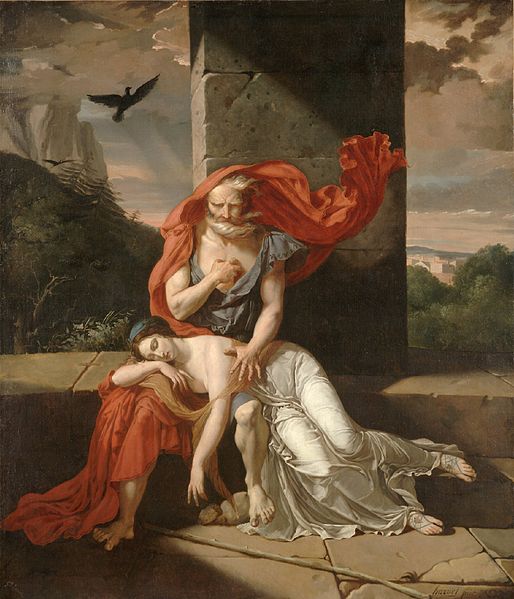Antigone daughter of Oedipus
“Antigone, the Defiant Princess: Her Tragic Battle for Justice!”

- Alias: None
- Gender: Female
- Race: Human
- Occupation: Princess of Thebes
- Religion: Greek Mythology
- Allies: Ismene (sister), Haemon (betrothed), Eurydice (mother)
- Enemies: King Creon (uncle), the laws of Thebes
- Abode/Base of operations: Thebes
- Nationality: Theban
- Languages: Ancient Greek
- Alignment: Lawful Good
- Affiliation(s): House of Oedipus
- Significant Others: Betrothed to Haemon
Antigone daughter of Oedipus, is a strong-willed and compassionate princess in Greek mythology. She lives in the city of Thebes, where her family’s tragic fate has left her with a profound sense of duty and honor. Her biggest fear is the injustice that prevails in her city, and she is driven by a deep desire to uphold moral and divine laws.
Despite the decree of her uncle, King Creon, forbidding the burial of her brother Polynices, Antigone’s unwavering determination leads her to defy the king’s order. She firmly believes that divine laws and the respect for the dead take precedence over human edicts. Antigone’s actions are guided by her unwavering sense of righteousness and love for her family.
Her ultimate goal is to provide her fallen brother with a proper burial, ensuring his soul’s journey to the afterlife. Antigone is willing to face the dire consequences of her defiance, even if it means defying the king’s authority and risking her own life. She seeks to challenge the unjust societal norms and honor the principles she holds dear, making her a symbol of moral courage and familial devotion in the world of Greek mythology.
Antigone, Daughter of Oedipus

Medium humanoid (Human), lawful good
Armor Class 11 (Simple Greek Clothing) Hit Points 58 (13d8) Speed 30 ft.
| STR | DEX | CON | INT | WIS | CHA |
|---|---|---|---|---|---|
| 10 (+0) | 12 (+1) | 12 (+1) | 16 (+3) | 18 (+4) | 14 (+2) |
Skills Insight +7, Religion +7 Senses Passive Perception 14 Languages Greek, understands Common Challenge 4 (1,100 XP)
Background Feature: Devotion. She has dedicated her life to upholding the divine laws and principles of morality. She can gain advantage on Charisma checks when interacting with individuals who share her religious beliefs.
Divine Sense. As an action, she can open her awareness to detect divine forces. Until the end of her next turn, she knows the location of any celestial, fiend, or undead within 60 feet of her that is not behind total cover. She can use this feature a number of times equal to 1 + her Wisdom modifier.
Spellcasting. She is a 5th-level spellcaster. Her spellcasting ability is Wisdom (spell save DC 15, +7 to hit with spell attacks). She has the following cleric spells prepared:
Cantrips (at will): Guidance, Sacred Flame, Thaumaturgy 1st level (4 slots): Bless, Cure Wounds, Sanctuary 2nd level (3 slots): Aid, Lesser Restoration 3rd level (2 slots): Beacon of Hope, Dispel Magic
Channel Divinity: Turn Undead. As an action, she presents her holy symbol and speaks a prayer to turn the undead. Each undead within 30 feet of her that can see or hear her must make a DC 15 Wisdom saving throw. If the creature fails its saving throw, it is turned for 1 minute or until it takes any damage.
Divine Intervention. Antigone can call on her deity for aid. It might intervene directly or send an agent to help. Antigone must be in good standing with her deity, and the deity’s alignment must be lawful good. The DM chooses the nature of the intervention; the effect should be significant but not guarantee success.
Actions
- Sacred Dagger. Melee Weapon Attack: +3 to hit, reach 5 ft., one target. Hit: 4 (1d4 + 1) piercing damage.
- Healing Touch (3/Day). She can use a bonus action to magically heal herself or an ally she touches. The target regains 2d8 + 4 hit points.
- Turn Undead (Recharge 5-6). She presents her holy symbol, and each undead within 30 feet of her that can see or hear her must make a DC 15 Wisdom saving throw. If the creature fails its saving throw, it is turned for 1 minute or until it takes any damage.
- Divine Blessing (1/Day). She can call upon the divine to bless herself or an ally within 30 feet. The target gains advantage on all saving throws for 1 minute.
Currently in the World
Antigone, the daughter of Oedipus, is a young woman of noble stature, radiating an air of quiet determination and inner strength. She stands at an average height with a graceful and slender build, her movements deliberate and composed. Her skin is fair, her features finely chiseled, and her long, dark hair cascades down her back in a simple, yet elegant style.
Currently, she is dressed in a modest, flowing gown of deep earthy tones, mainly browns and greens, reflecting her connection to the natural world and her principled character. Over her attire, she wears a cloak of somber gray, symbolizing her resolve in the face of adversity. Her clothing is practical, designed for ease of movement, yet it carries an air of regal dignity.
Antigone is engaged in a solemn task, standing before a makeshift funeral pyre, where her brother Polynices lies. She is carefully arranging funeral flowers, a sign of her unwavering commitment to giving her brother a proper burial, despite the decree of King Creon.
Her surroundings are a rocky and desolate landscape, not far from the city of Thebes. The scene is marked by tension and sorrow, with the threat of dire consequences looming over Antigone. The mood is one of profound sadness mixed with a resolute determination to do what she believes is morally right, regardless of the personal cost.
In Myth

Antigone, daughter of Oedipus, is a tragic heroine in Greek mythology. Her story unfolds in the city of Thebes, where she faces a moral dilemma of profound proportions. It all begins with a bitter conflict between her brothers, Polynices and Eteocles, who vie for control of Thebes. Their power struggle leads to a brutal war, resulting in both brothers’ deaths.
The ruler of Thebes, King Creon, decrees that Polynices, the rebel brother, is not to be given a proper burial or even mourned. He orders that anyone who dares to defy this decree will face death by stoning.
Antigone, driven by her unwavering devotion to her family and her belief in divine law, decides to defy King Creon’s cruel edict. She believes that the bonds of family and the laws of the gods outweigh any earthly decree. Despite the risk to her own life, Antigone buries her brother Polynices with all the honor he deserves.
Her act of defiance sets off a tragic chain of events. She is caught and brought before King Creon, who is her uncle. Antigone, undeterred, openly admits her actions, arguing that divine law takes precedence over human law. She remains resolute and fearless in the face of Creon’s cruel judgment.
Creon, initially unyielding, eventually has a change of heart. He decides to release her, recognizing the injustice of his own decree. However, it is too late. Antigone, imprisoned in a tomb, takes her own life. This devastating turn of events leads to further tragedy, as Creon’s son Haemon, who was in love with Antigone, takes his own life out of grief. Queen Eurydice, Haemon’s mother, also meets a tragic end.
Antigone’s unwavering commitment to her principles ultimately leads to the destruction of her adversary, King Creon, and his family. Her story stands as a timeless example of the clash between personal conscience, family loyalty, and the authority of the state.

 Buy me a coffee
Buy me a coffee